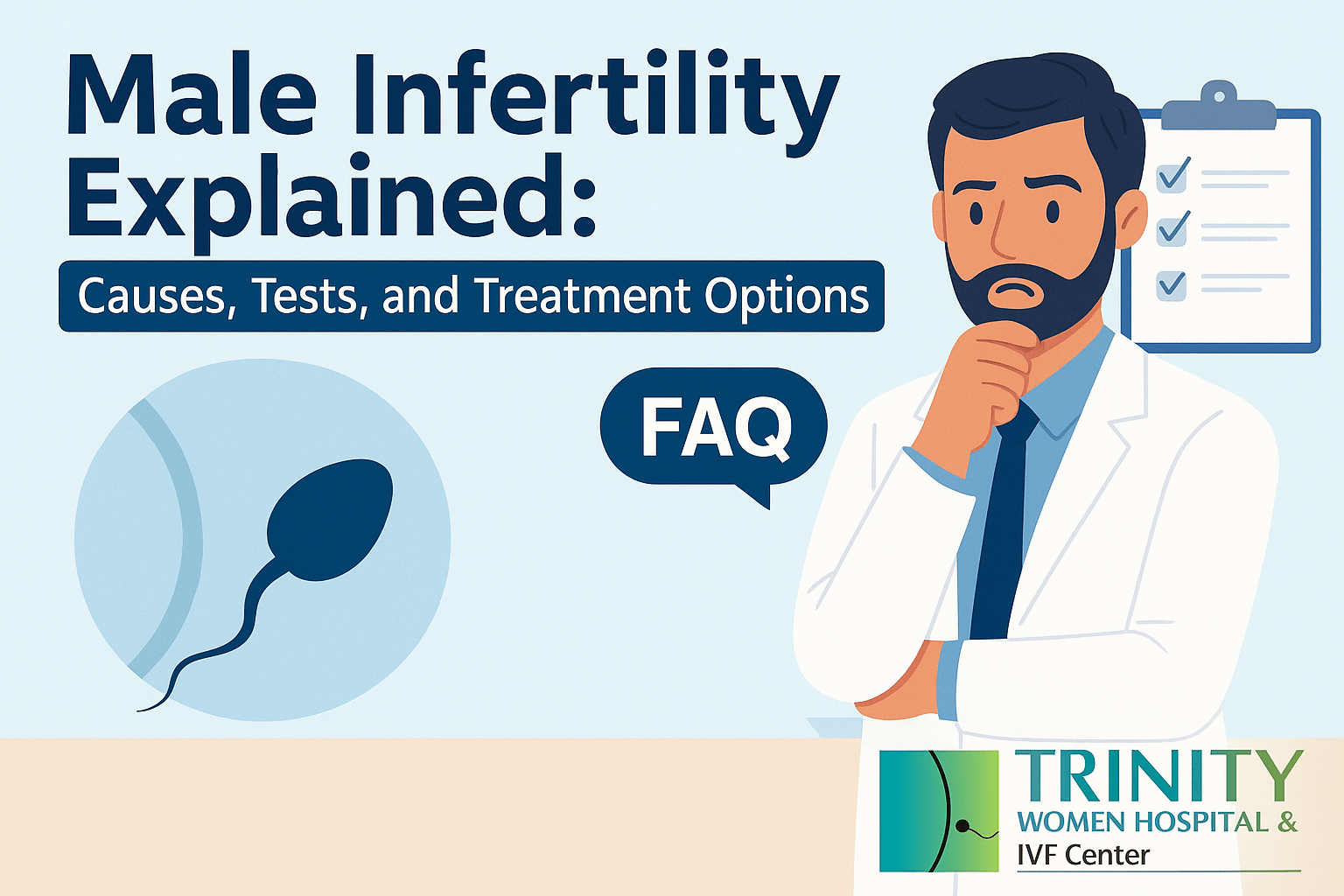When a couple struggles to conceive, the assumption often leans toward female infertility. But research shows a very different reality: male infertility contributes to nearly 40–50% of all infertility cases worldwide. This means that for almost half of the couples trying to have a baby, male reproductive health plays a crucial role.
The encouraging part is that in most cases, male infertility is treatable. With the right diagnosis, lifestyle adjustments, and medical support, many men can improve their fertility and achieve parenthood. At Trinity IVF Ahmedabad, we specialize in identifying the underlying causes of male infertility and offering tailored treatments—from lifestyle counseling to advanced techniques like ICSI.
🤔 Why Talk About Male Infertility?
Unfortunately, there’s still a stigma around male infertility. Many men hesitate to undergo tests because they believe infertility is only a “women’s problem.” This delay not only affects chances of conception but also takes a toll on the emotional health of both partners.
Talking openly about male infertility helps in two important ways:
- Breaking myths – Infertility isn’t just a female issue.
- Encouraging early diagnosis – The earlier the evaluation, the better the treatment outcomes.
🚫 Common Causes of Male Infertility
Male infertility isn’t a single condition. It can result from several factors, sometimes overlapping. Here are the most common causes:
1. Low Sperm Count (Oligospermia)
A healthy sperm count ranges between 15 million to 200 million sperm per milliliter of semen. When the count falls below this, fertilization becomes difficult.
2. Poor Sperm Motility
Even with enough sperm, if they can’t swim efficiently, they may never reach the egg. Poor motility is one of the biggest contributors to infertility.
3. Abnormal Sperm Morphology
Shape matters. Sperm with irregular heads or tails cannot fertilize an egg effectively.
4. Hormonal Imbalances
Low testosterone or disruptions in hormones like FSH, LH, and prolactin can hinder sperm production.
5. Varicocele
A varicocele is an enlarged vein inside the scrotum. It can overheat the testes and reduce sperm quality.
6. Infections
Untreated STIs, mumps (in adulthood), or urinary infections can damage sperm-producing tissues.
7. Lifestyle Factors
- Smoking and alcohol reduce sperm quality.
- Obesity lowers testosterone.
- Prolonged heat exposure (saunas, laptops on laps, tight underwear) damages sperm.
- Chronic stress disrupts hormone balance.

🔬 Diagnostic Tests for Male Fertility
The first step in treatment is understanding the exact cause. At Trinity IVF, our male fertility evaluation is thorough, respectful, and confidential.
1. Semen Analysis
- Measures sperm count, motility, morphology, and semen volume.
- Usually repeated twice for accuracy.
2. Hormonal Testing
- Evaluates testosterone, FSH, LH, and prolactin levels.
- Identifies if hormonal imbalance is affecting sperm production.
3. Scrotal Ultrasound
- Detects varicocele, blockages, or testicular abnormalities.
4. Genetic Tests
- For men with very low sperm count or azoospermia.
- Identifies Y-chromosome microdeletions or other hereditary conditions.
5. Testicular Biopsy
- Done if semen contains no sperm.
- Doctors check directly if sperm production is occurring inside the testes.
📌 Fun fact: In some azoospermia cases, sperm can be retrieved directly from the testes and used for ICSI, giving couples a real chance at parenthood.
💊 Lifestyle & Medical Treatments for Male Infertility
Treatment depends on the underlying cause. For many men, small changes can make a huge difference.
Lifestyle Changes That Boost Fertility
- Quit smoking and alcohol.
- Maintain a healthy weight with regular exercise.
- Sleep 7–8 hours daily.
- Manage stress through yoga, meditation, or hobbies.
- Avoid tight clothing and prolonged laptop use on the lap.
Nutritional Support
Supplements like zinc, selenium, CoQ10, omega-3 fatty acids, and folic acid are proven to enhance sperm health. A diet rich in antioxidants (fruits, vegetables, nuts, and seeds) is equally important.
Medical Treatments
- Hormonal Therapy – Balances testosterone and other hormones.
- Antibiotics – Treat infections that harm sperm production.
- Medications for Erectile Dysfunction – Improve sexual health and performance.
Surgical Treatments
- Varicocele repair – Improves sperm quality significantly.
- Sperm retrieval techniques like TESE (Testicular Sperm Extraction) and PESA (Percutaneous Epididymal Sperm Aspiration).
🧪 When to Consider IVF or ICSI
When natural methods and medical treatments aren’t enough, assisted reproductive techniques (ART) offer solutions.
- IVF (In Vitro Fertilization): Eggs and sperm are fertilized in a lab.
- ICSI (Intracytoplasmic Sperm Injection): A single sperm is injected directly into an egg.
ICSI is particularly effective for:
- Severe low sperm count.
- Poor motility or morphology.
- Cases of azoospermia where sperm are retrieved surgically.
At Trinity IVF Ahmedabad, we use the most advanced ICSI technology, ensuring high success rates even in challenging cases.
🌟 Success Stories from Trinity IVF
Real-life examples often give hope where statistics cannot.
- A 36-year-old man with zero sperm count (azoospermia) underwent TESE followed by ICSI. The couple is now parents to healthy twin boys.
- Another couple, after years of failed attempts elsewhere, achieved success at Trinity IVF with ICSI despite the husband’s poor sperm motility. They now have a beautiful baby girl.
“After multiple disappointments, Trinity IVF gave us clarity, care, and hope. Today, our family is complete thanks to them.”
❓ Frequently Asked Questions (FAQs)
1. What are the main causes of male infertility?
Causes include low sperm count, motility issues, abnormal sperm shape, hormonal imbalances, infections, varicocele, genetics, and unhealthy lifestyle habits.
2. How is male infertility diagnosed?
It begins with semen analysis and may include hormone tests, ultrasounds, genetic testing, or biopsy.
3. Is male infertility treatable?
Yes. Lifestyle changes, medications, surgeries, and assisted reproduction (IVF/ICSI) can help most men.
4. Can stress cause infertility?
Yes. Chronic stress affects hormones and sexual health. Managing stress can improve fertility outcomes.
5. What lifestyle changes improve sperm health?
Quit smoking, reduce alcohol, exercise, eat a nutrient-rich diet, and avoid prolonged heat exposure.
🎯 Conclusion: Male Fertility Can Be Treated
Male infertility is more common than most realize, but the important message is this: it is treatable. With accurate diagnosis, lifestyle improvements, medical support, and advanced reproductive technologies like ICSI, fatherhood is possible for many men who once lost hope.
If you and your partner are struggling with male factor infertility, don’t wait. Early evaluation is key to success. Reach out to Trinity IVF Ahmedabad for a confidential consultation and personalized treatment plan.

